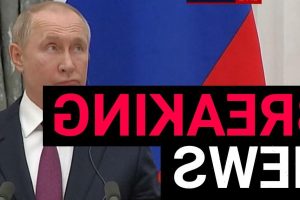Putin says he 'does not want war' but accuses Ukraine of 'genocide'

Vladimir Putin has insisted he does not want war in Europe but said Ukraine is responsible for ‘genocide’ in the east of the country.
The Russian president confirmed a decision had been taken to move some forces away from border, a move which has raised hopes of a deescalation.
But he ratcheted up the rhetoric on areas in eastern Ukraine which are held by pro-Moscow forces.
The mixed comments keep the world guessing about whether or not he intends to invade: on the one hand, he suggested there is still room for constructive talks; on the other, he accused Kyiv of human rights abuses against its Russian-speaking population in the Donbas region.
Mr Putin was urged to adopt the breakaway republics in Lukansk and Donetsk by his parliament today, which have been at war with Ukraine since 2014.
The Russian president did not rule out officially recognising them as Russian territory, a move which would effectively end the frozen peace process for good, while simultaneously calling for talks to continue on resolving the situation diplomatically.
Russia annexed Crimea in 2014 following Ukraine’s pro-Europe revolution, a move which was condemned by the West but did not result in a military response.
Mr Putin’s comments raise the prospect of similar military action in the Donbas region, despite his insistence that he wants to continue peaceful discussions with the West.
The Russian president detailed the gulf that still remains between Russia and the West on renegotiating defence arrangements on the continent.
He said the military alliance is ‘right on our doorstep’ and reiterated calls for a return to pre-1997 Nato deployments in Europe and for Ukraine to be permanently blocked from joining.
Mr Putin signalled a willingness to begin formal negotiations on bilaterally scaling back the presence of long-range missiles, transparency around military drills and other ‘confidence-building measures’.
But he made it clear this was dependent on the West addressing his core concerns on Nato enlargement, which have already been rejected out of hand by Washington and allies.
The Russian president was speaking alongside German chancellor Olaf Scholz after talks between the pair.
Relations between Munich and Moscow are central to the European response to the Ukraine crisis given Germany’s reliance on Russian gas imports.
Mr Scholz struck a positive tone and concurred with messaging from Boris Johnson and Joe Biden that the window for a peace resolution is still open.
He said: ‘It was right that NATO and the European Union responded to the letters from Russia, and while Russia does not agree with the response, it is a good sign that it says there are a few good points in it.
‘Likewise, NATO, the EU, and we do not agree with the demands of Russia, but we believe there are some points in there that are worth discussing.’
Source: Read Full Article


